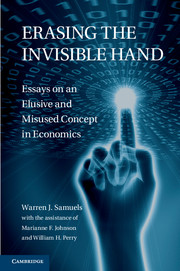Book contents
- Frontmatter
- Contents
- Acknowledgments
- Preface
- 1 Adam Smith’s Invisible Hand and the Nobel Prize in Economic Sciences
- 2 The Political Economy of Adam Smith
- 3 On the Identities and Functions of the Invisible Hand
- 4 Adam Smith's History of Astronomy Argument
- 5 The Invisible Hand, Decision Making, and Working Things Out
- 6 The Invisible Hand in an Uncertain World with an Uncertain Language
- 7 The Invisible Hand as Knowledge
- 8 The Invisible Hand and the Economic Role of Government
- 9 The Survival Requirement of Pareto Optimality
- 10 Conclusions and Further Insights
- References
- Index
7 - The Invisible Hand as Knowledge
Published online by Cambridge University Press: 07 October 2011
- Frontmatter
- Contents
- Acknowledgments
- Preface
- 1 Adam Smith’s Invisible Hand and the Nobel Prize in Economic Sciences
- 2 The Political Economy of Adam Smith
- 3 On the Identities and Functions of the Invisible Hand
- 4 Adam Smith's History of Astronomy Argument
- 5 The Invisible Hand, Decision Making, and Working Things Out
- 6 The Invisible Hand in an Uncertain World with an Uncertain Language
- 7 The Invisible Hand as Knowledge
- 8 The Invisible Hand and the Economic Role of Government
- 9 The Survival Requirement of Pareto Optimality
- 10 Conclusions and Further Insights
- References
- Index
Summary
Introduction
The meaningfulness of the concept of the invisible hand depends on the status of the invisible hand as knowledge. Essay 6 examined the linguistic status of the concept. This essay is concerned with the concept’s ontological and epistemological status. Considerably more attention has been given in the literature to linguistic issues than to ontological and epistemological issues. The results of this discussion were essentially negative. The ontological and epistemological issues, rarely directly discussed in the literature, are actually fairly straightforward. Once again, however, the results of the discussion are negative.
Ontology and the Status of the Invisible Hand
Metaphysics has to do with absolutes and ultimates. One branch of metaphysics, cosmology, deals with the origin and structure of the world, or universe, broadly defined. Closely related is ontology, which has to do with the ultimate nature of being, existence (both per se and nature), and/or reality, including first principles. Theology is the study of the nature of God and the relations of God to the universe and to humankind, as well as the study of religious doctrine. Ethics is the study of standards of conduct and of moral judgment, and comprises the domain of normative propositions (dealing with goodness, propriety, and ought). Epistemology is the theory of knowledge, which some scholars place within metaphysics. Cosmology, ontology, epistemology, theology, and ethics have in common the subject matter of existence whose ultimate content, nature, or first principles generally cannot be directly dealt with and/or experienced, and whose study is substantially conjectural. Accordingly, propositions that arguably form the content of these fields are matters of assertion. They provide no basis for study that permits either conclusive confirmation or disconfirmation of their existence or characteristics, nor do they have conclusive metaprinciples enabling comparisons and/or choice of competing principles.
- Type
- Chapter
- Information
- Erasing the Invisible HandEssays on an Elusive and Misused Concept in Economics, pp. 164 - 178Publisher: Cambridge University PressPrint publication year: 2011



